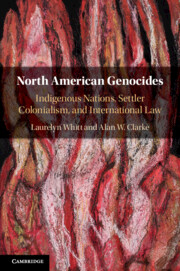Book contents
- North American Genocides
- North American Genocides
- Copyright page
- Dedication
- Epigraph
- Contents
- Preface
- Acknowledgments
- Introduction
- Chapter 1 North American Genocide Denial
- Chapter 2 The Legal Case for North American Genocides: a Retrospective Methodology
- Chapter 3 Settler Colonialism and Indigenous Nations
- Chapter 4 A Legal Primer for Settler Colonial Genocides
- Chapter 5 The Beothuk Nation (1500–1830)
- Chapter 6 The Powhatan Tsenacommacah (1607–1677)
- Chapter 7 The Conventional Account of Genocide: from a Restrictive to an Expansive Interpretation
- Chapter 8 Toward an Account of Systemic Genocide
- Appendix Convention on the Prevention and Punishment of the Crime of Genocide
- Index
Chapter 5 - The Beothuk Nation (1500–1830)
Published online by Cambridge University Press: 12 July 2019
- North American Genocides
- North American Genocides
- Copyright page
- Dedication
- Epigraph
- Contents
- Preface
- Acknowledgments
- Introduction
- Chapter 1 North American Genocide Denial
- Chapter 2 The Legal Case for North American Genocides: a Retrospective Methodology
- Chapter 3 Settler Colonialism and Indigenous Nations
- Chapter 4 A Legal Primer for Settler Colonial Genocides
- Chapter 5 The Beothuk Nation (1500–1830)
- Chapter 6 The Powhatan Tsenacommacah (1607–1677)
- Chapter 7 The Conventional Account of Genocide: from a Restrictive to an Expansive Interpretation
- Chapter 8 Toward an Account of Systemic Genocide
- Appendix Convention on the Prevention and Punishment of the Crime of Genocide
- Index
Summary
The fate of the Beothuk Nation provides a paradigm case of the devastation of a people as the result of colonization of their lands and resources by a settler population heavily engaged in the establishment and success of commercial markets. The story begins in apparent amity between small numbers of newcomers and the Indigenous residents of Newfoundland. It proceeds through mounting tensions as the former increased in number, moving from a subsistence fishing, hunting, and trapping economy to one driven by commercial market forces, where the settlers increasingly compromised and eroded Beothuk conditions of life. Settlers forced them to abandon traditional food sources, subjected them to repeated and intensifying violence, and confined them to smaller, less desirable portions of their homelands. Inadequate shelter, lack of proper nutrition, starvation, and mounting physical and mental stresses combined to weaken their resistance to disease and ability to reproduce. Those in Great Britain who were ultimately responsible for colonial policy and settler oversight knew of these developments but failed to act until it was too late. The story ends, it would seem, in the demise of the Beothuk as a distinct cultural and physical entity. But is it also a story of genocide?
- Type
- Chapter
- Information
- North American GenocidesIndigenous Nations, Settler Colonialism, and International Law, pp. 100 - 116Publisher: Cambridge University PressPrint publication year: 2019



